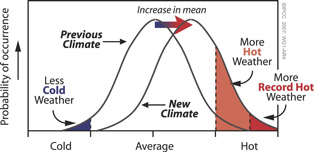Global Warming Does Damage, Congress Does Nothing
I was chatting with a neighbor’s family visiting from Texas earlier this week, and learned that they were celebrating a momentous event—a new record for 100 degree days in a single year. When I say celebrating, of course, I don’t mean it literally. It’s not a record anyone was hoping to break.
I was chatting with a neighbor’s family visiting from Texas earlier this week, and learned that they were celebrating a momentous event—a new record for 100 degree days in a single year. When I say celebrating, of course, I don’t mean it literally. It’s not a record anyone was hoping to break.
West Texas isn’t just hot this summer; it’s also been dry. Farmers and others in the region are struggling with anexceptionally severe drought covering the entire state. And, since hot, dry weather is ideal for fires, the state has also had to cope with historically bad wildfires, which have burned over 4 million acres this year.
So far, it’s a pretty dramatic follow up to the hottest year on record.
This is one of the ways that global warming is affecting our weather, and will continue to in the future. As weather patterns change, large areas will lose rainfall, see hotter temperatures, and suffer more extreme heat waves. That’s a problem for farmers who count on the existing weather patterns in those areas, and for all of us who eat the food they produce.
Of course, drought isn’t the only result we’ll see from global warming. We’ll also see more strong storms dumping heavy rainfall on the areas they hit—like the tropical storm that’s causing serious floods in Pennsylvania this week. Rain is best served in measured doses, a little for everyone. Unfortunately, global warming pushes it in the direction of feast or famine.
As the team from Climate Communication, including Drs. Kevin Trenberth and Jerry Meehl of the National Center for Atmospheric Research, noted in a press conference this week:
All weather events are now influenced by climate change because all weather now develops in a different environment than before. While natural variability continues to play a key role in extreme weather, climate change has shifted the odds and changed the natural limits, making certain types of extreme weather more frequent and more intense. The kinds of extreme weather events that would be expected to occur more often in a warming world are indeed increasing.
All across the country, global warming is having an impact. Heat waves, droughts, and severe rainstorms do real damage, to human health and property alike. Now more than ever, we need our political leaders to take steps to rein in global warming while we still have time.
In Washington, though? Not a peep. Just another reminder that it’ll take more than scientific evidence and real world impacts to get our government to do something about global warming. If politicians can ignore this they’re not likely to listen to anything short of a demand from the voting public that they take action.
Figure: Climate Change Shifts the Odds for Extreme Weather Events

